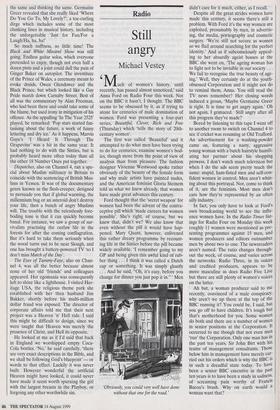Radio
Still angry
Michael Vestey
Much of women's history, until recently, has passed almost unnoticed,' said Anna Ford on Radio Four this week. Not on the BBC it hasn't, I thought. The BBC seems to be obsessed by it, as if trying to atone for centuries of male domination of women. Ford was presenting a four-part series, Beautiful, Clever, Rich and Free (Thursday) which 'tells the story of 20th- century women'.
The first was called 'Beautiful' and it attempted to do what men have been trying to do for centuries, examine women's bod- ies, though more from the point of view of analysis than from pleasure. The fashion designer Vivienne Westwood spoke rather obviously of the beauty of the female form and why male artists have painted nudes, and the American feminist Gloria Steinem told us what we knew already, that women have made great advances this century.
Ford thought that the 'secret weapon' for women had been the advent of the contra- ceptive pill which 'made careers for women possible'. She's right, of course, but we knew that, didn't we? We also know that even without the pill it would have hap- pened. Mary Quant, however, enlivened this rather dreary programme by recount- ing life in the Sixties before the pill became widely available. 'I remember going to my GP and being given this awful kind of rub- ber thing . . . I think it was called a Dutch cap or something. It was simply ghastly . . . And he said, "Oh, it's easy, before you change for dinner you just pop it in." ' Men
`Obviously, you could very well have done without that one for the road.' didn't care for it much, either, as I recall.
Despite all the great strides women have made this century, it seems there's still a problem. With Ford it's the way women are exploited, presumably by men, in advertis- ing, the media, pornography and cosmetic surgery. 'We're still not secure as women so we flail around searching for the perfect identity.' And as if subconsciously appeal- ing to her absurdly ageist bosses at the BBC she went on, 'The ageing woman has to fight not to be invisible in our society . . . We fail to recognise the true beauty of age- ing.' Well, they certainly do at the youth- obsessed Corporation and it might not do to remind them, Anna. You still read the TV news remember? Her closing words induced a groan, 'Maybe Germaine Greer is right. It is time to get angry again.' Oh not again, I grimaced. Still angry after all this progress they've made?
Bored by listening to this tape I went off to another room to switch on Channel 4 to see if cricket was resuming at Old Trafford. An advertisement for a washing-powder came on, featuring a nasty, aggressive young woman with a butch hairstyle humili- ating her partner about his shopping prowess. I don't watch much television but when I do the ads seem pretty much the same: stupid, ham-fisted men and self-con- fident women in control. Men aren't whin- ing about this portrayal. Nor, come to think of it, are the feminists. Most men don't care how they're represented by an often silly industry.
In fact, you only have to look at Ford's own broadcasting world to see the influ- ence women have. In the Radio Times list- ings for Radio Four on Monday this week roughly 11 women were mentioned as pre- senting programmes against 15 men, and women producers and editors outnumber men by about two to one. The newsreaders aren't named. The ratio changes through- out the week, of course, and varies across the networks. Radio Three, in its voices and credited producers, appears to be more masculine as does Radio Five Live but there are still plenty of women's voices on the latter.
Ah but, a woman producer said to me recently, convinced of a male conspiracy, why aren't we up there at the top of the BBC running it? You could be, I said, but you go off to have children. It's tough but that's motherhood for you. Some women do both and there are a number of women in senior positions at the Corporation. It occurred to me though that not even men `run' the Corporation. Only one man has in the past ten years, Sir John Birt with his teams of management consultants. Those below him in management have merely car- ried out his orders which is why the BBC is in such a dreadful state today. To have been a senior BBC executive in the past ten years is to have been a study in sadness, of screaming pain worthy of Francis Bacon's brush. Why on earth would a woman want that?


























































 Previous page
Previous page